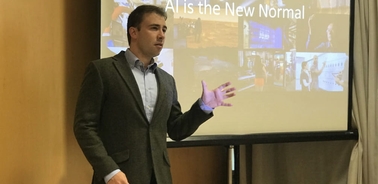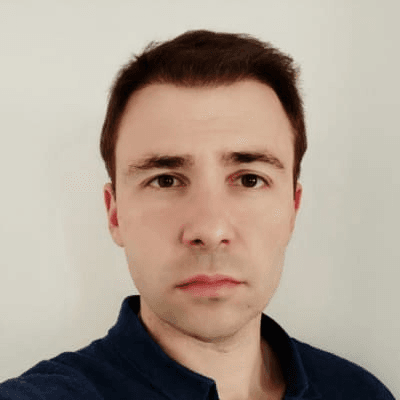Faculty Spotlight: Miguel González-Fierro

Meet one of IE’s School of Science and Technology most influential thought leaders.
Miguel González-Fierro is a Principal Data Science Manager at Microsoft Spain, where he helps customers solve business problems using artificial intelligence and machine learning. Previously, he was CEO and founder of Samsamia Technologies, a company that created a visual search engine for fashion items allowing users to find products using images instead of words, and founder of the Robotics Society of Universidad Carlos III, which developed different projects related to UAVs, mobile robots, humanoid robots, and 3D printers. Miguel has also worked as a robotics scientist at Universidad Carlos III of Madrid (UC3M) and King’s College London (KCL) and has collaborated with other universities like Imperial College London.
What that means to his students at IE School of Science and Technology, is that Miguel brings to the classroom a wealth of professional knowledge and helps students understand and apply AI.
Meet one of IE School of Science and Technology’s thought leaders.
What brought you to IE? Where were you before? And what keeps you here?
I feel attracted to IE due to its high standards. IE is one of the most recognized business schools in the world. IE is proof that in Spain we can have an education system as good as the best education institutions in the world. When I heard that IE was going to create an undergrad University, that attracted my attention. Being part of the pool of professors has been an amazing experience for me.
Before joining IE, I collaborated with Imperial College in London, and Universidad Carlos III in Madrid. From IE I admire their international focus, it is very nice walking around the IE University campus and hearing people speaking in English, Italian, and French, apart from Spanish. I also admire the focus on excellence, in Spain, we don’t have universities in the top 100, so it is refreshing to see IE try to get a spot in that list.
One thing I’ve learned during my international experience at Microsoft, working with people that went to MIT, Stanford, Oxford, etc. is that they are not smarter than us. In Spain, there is fantastic talent that a lot of times we don’t recognize. I believe that IE can be among the top universities in the world.
Where do you work outside of IE and what is most exciting to you about this role in your professional career?
I work at Microsoft developing internal AI solutions, and before that, I worked in customer-facing roles helping our customers build AI solutions on Azure. The most exciting part of working at Microsoft is the talent, and, being able to collaborate with some of the best people in the world in AI. My observation is that, in general, technical people are not good at asking for help from others. We tend to do everything ourselves. During my career, the most successful projects I have participated in were in collaboration with talented people.
Have you ever had an a-ha moment while teaching that furthered your research? What was it?
A quote I heard from the Spanish philosopher Alfonso Lopez Quintás, that I repeat often to my students is: “I cannot teach you, you have to learn”. This is the main reason why my classes are fundamentally practical. Students have to form groups, so they are forced to work together, and develop a project, so they learn and practice what I explain in class.
What book do you wish your students would read before taking your class and why?
I talk a lot about books during my classes, but not necessarily technical ones. One fundamental book, in my view, is Man Search for Meaning, by Viktor Frankl. In it, Frankl explains the relationship between responsibility, freedom, and meaning. Most of the students are at an age where they are enjoying the freedom of being an adult, but few of them have real responsibilities. According to Frankl, life is not about happiness, it’s about taking a self-imposed responsibility, and finding meaning in it. I tell the students that during their years of university, one of their main jobs, apart from having fun and passing the exams, is finding their calling. The calling is what they would like to spend their life doing, their life task. Once you find it, everything changes. You’ll find your meaning, and you will take any responsibility to fulfill your calling.
Another author I love is Ortega y Gasset. The Revolt of the Masses is a masterpiece. In relation to meaning and responsibility, Ortega said: “Our life is awareness of what is possible for us. If at each moment we had before us only one possibility, it would be meaningless to call it that. It would rather be a pure necessity. [...] But destiny, what vitally has to be or not has to be, is not discussed but is accepted or not. If we accept it, we are authentic; if we do not accept it, we are the denial, the falsification of ourselves.”
I really love reading. I can talk about books for hours.
Please name one of your articles or studies you feel addresses the most important issues for 2023?
My area of focus is AI. I believe that understanding AI is one of the top skills that can be learned nowadays. AI is going to touch every single industry, and it will help us to enhance our intelligence. It will give us superpowers.
I share a log of content on LinkedIn. Here is a recent popular post was where I briefly explained how ChatGPT worked. I also share many of my thoughts on my website.
Tell us one personal thing about yourself that none of your students know. A hobby, sport or talent? Strange fact? Unusual interest?
In my GitHub profile I have a picture of a robot. Its name is HOAP, and it is the humanoid robot I did my PhD thesis with. It also knows how to dance. You can watch the YouTube video.
